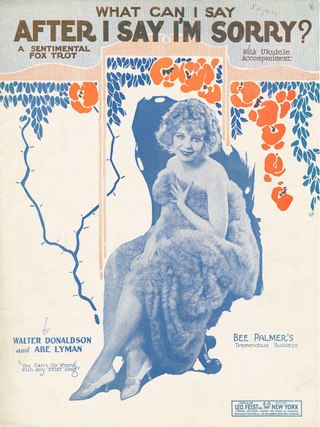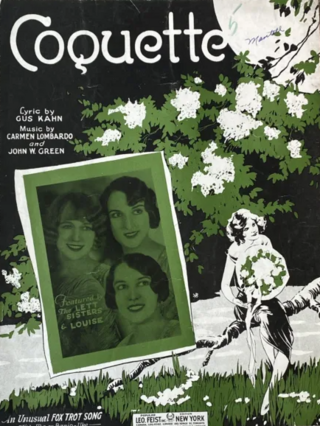Related Research Articles
"Thinking of You" is a popular song, composed by Harry Ruby with lyrics by Bert Kalmar. It was introduced in the Broadway show, The Five O'Clock Girl (1927) when it was sung by Mary Eaton and Oscar Shaw.
"A Hundred Years from Today" is a popular song published in 1933 with music by Victor Young and lyrics by Ned Washington and Joe Young. The song was included in the London production of Lew Leslie's Blackbirds of 1934.

"Painting the Clouds with Sunshine" is a popular song published in 1929. The music was written by Joe Burke and the lyrics by Al Dubin for the 1929 musical film Gold Diggers of Broadway when it was sung by Nick Lucas. Gold Diggers of Broadway is a partially lost film, and the scene featuring the song is one of the only surviving scenes of the movie.
"The One I Love (Belongs to Somebody Else)" is a popular song composed by Isham Jones with lyrics by Gus Kahn. The song was recorded by Isham Jones' Orchestra on December 21, 1923, at Brunswick Studios in New York City, and published on January 7, 1924. On January 17 in Chicago, Jones recorded another version, with Al Jolson on lead vocals. Both versions made the charts that Spring, with Jolson's peaking at number 2, and Jones' at number 5. Sophie Tucker recorded her version February 1924, released on Okeh 40054.
"Don't Take Your Love from Me" is a popular song written by Henry Nemo and published in 1941. Mildred Bailey first recorded this song in 1940 before publication. It was introduced that year by singer Joan Brooks.

"Somebody Loves Me" is a popular song, with music written by George Gershwin, and lyrics by Ballard MacDonald and Buddy DeSylva. The song was published in 1924 and featured in George White's Scandals of 1924.
"Put 'em in a Box, Tie 'em with a Ribbon, and Throw 'em in the Deep Blue Sea" is a popular song. The music was written by Jule Styne, the lyrics by Sammy Cahn. The song was published in 1947, and was further popularized in the 1948 movie Romance on the High Seas, where it was sung by Doris Day accompanied by the Page Cavanaugh Trio. The lyrics deal with a person who is through with love and therefore metaphorically wants to throw everything away in a box into the sea.
"Isn't It Romantic?" is a popular song and part of the Great American Songbook. The music was composed by Richard Rodgers, with lyrics by Lorenz Hart. It has a 32-bar chorus in A–B–A–C form. Alec Wilder, in his book American Popular Song: The Great Innovators 1900–1950, calls it "a perfect song."
"(I Love You) for Sentimental Reasons" is a popular song written by Ivory "Deek" Watson, founding member of the Ink Spots and of the Brown Dots, and William "Pat" Best, founding member of the Four Tunes.
"The Lady's in Love with You" is a popular song which was written by Burton Lane (music) and by Frank Loesser (lyrics). The song was published in 1939 and introduced in the film "Some Like It Hot" (1939) when it was sung by Bob Hope and Shirley Ross. Ms Ross also sang it in the film with Gene Krupa and His Band. The song was sung by Tony Bennett at his final concerts, at Radio City Music Hall, in 2021.
"I'm Putting All My Eggs in One Basket" is a popular song written by Irving Berlin for the 1936 film Follow the Fleet, where it was introduced by Fred Astaire and Ginger Rogers. Astaire had a huge hit with the song in 1936 and other popular versions that year were by Jan Garber and by Guy Lombardo.
"Get Out of Town" is a 1938 popular song written by Cole Porter, for his musical Leave It to Me!, where it was introduced by Tamara Drasin.

"What Can I Say After I Say I'm Sorry?" is a popular song by Walter Donaldson and Abe Lyman, published in 1926.
"Please Be Kind" is a 1938 American song composed by Saul Chaplin with lyrics by Sammy Cahn. Popular recordings that year were by Mildred Bailey and the Red Norvo Orchestra; Bob Crosby & His Orchestra ; and by Benny Goodman & His Orchestra.
"Flamingo" (1940) is a popular song and jazz standard written by Ted Grouya with lyrics by Edmund Anderson and first recorded by singer Herb Jeffries and the Duke Ellington Orchestra on December 28, 1940, for Victor Records. This briefly reached the Billboard charts in 1941.

"Runnin' Wild" is a popular song first composed and recorded in 1922, written by Arthur Harrington Gibbs with lyrics by Joe Grey and Leo Wood.
Liza (All the Clouds'll Roll Away)" is a song composed by George Gershwin with lyrics by Ira Gershwin and Gus Kahn. It was introduced in 1929 by Ruby Keeler (as Dixie Dugan) in Florenz Ziegfeld's musical Show Girl. The stage performances were accompanied by the Duke Ellington Orchestra. On the show's opening night in Boston on June 25, 1929, Keeler's husband and popular singer Al Jolson suddenly stood up from his seat in the third row and sang a chorus of the song, much to the surprise of the audience and Gershwin himself. Jolson recorded the song a few days later on July 6, 1929, and his rendition rose to number nine on the charts of the day.
"There's a Rainbow 'Round My Shoulder" is a 1928 song sung by Al Jolson in the early Warner Bros. talking picture The Singing Fool the same year. The song, along with "Sonny Boy" and "I'm Sitting on Top of the World", which were also in The Singing Fool, were big hits for Jolson. The song was written by Al Jolson, Billy Rose and Dave Dreyer.
Moanin' Low is a popular torch song. The music was written by Ralph Rainger; the lyrics by Howard Dietz. The song was published in 1929 and was introduced that same year in the musical revue The Little Show by Libby Holman becoming a hit and Holman's signature song. A recording by The Charleston Chasers was also popular in 1929.

"Coquette" is a 1928 fox trot jazz standard. It was composed by Johnny Green and Carmen Lombardo, with lyrics by Gus Kahn. Guy Lombardo had great success with the song in 1928.
References
- ↑ Whitburn, Joel (1986). Joel Whitburn's Pop Memories 1890-1954 . Wisconsin, USA: Record Research Inc. p. 131. ISBN 0-89820-083-0.
- ↑ "The Online Discographical Project". 78discography.com. Retrieved February 21, 2018.
- ↑ "The Online Discographical Project". 78discography.com. Archived from the original on January 16, 2016. Retrieved February 21, 2018.
- ↑ "The Online Discographical Project". 78discography.com. Retrieved February 23, 2018.
- ↑ "www.allmusic.com". allmusic.com. Retrieved December 23, 2024.
- ↑ "www.allmusic.com". allmusic.com. Retrieved December 24, 2024.
- ↑ "www.allmusic.com". allmusic.com. Retrieved December 24, 2024.
- ↑ "www.discogs.com". www.discogs.com. Retrieved December 25, 2024.
- ↑ "www.allmusic.com". allmusic.com. Retrieved December 25, 2024.
- ↑ "Discogs.com". Discogs.com. Retrieved February 23, 2018.
- ↑ "www.allmusic.com". allmusic.com. Retrieved December 23, 2024.